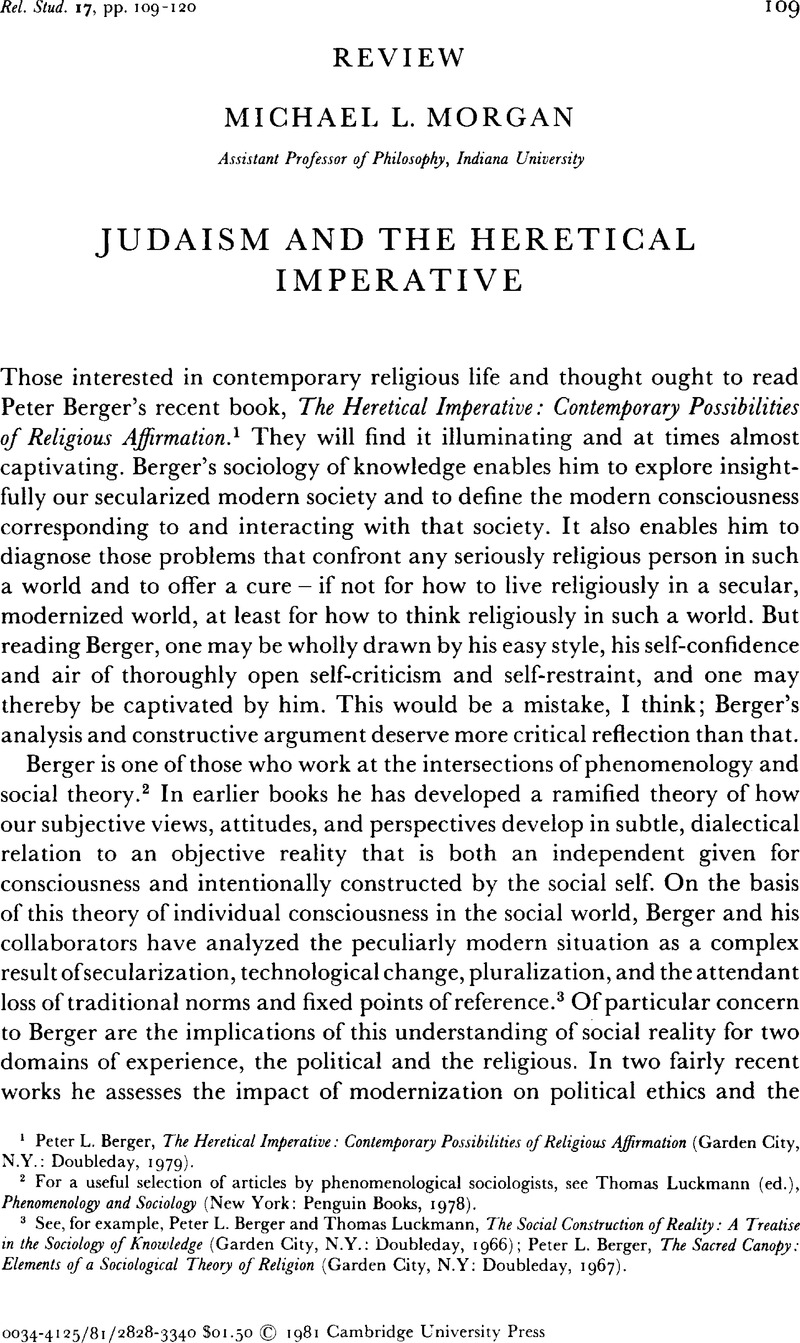No CrossRef data available.
Article contents
Judaism and the Heretical Imperative
Published online by Cambridge University Press: 24 October 2008
Abstract

- Type
- Review Article
- Information
- Copyright
- Copyright © Cambridge University Press 1981
References
page 109 note 1 Berger, Peter L., The Heretical Imperative: Contemporary Possibilities of Religious Affirmation (Garden City, N.Y.: Doubleday, 1979).Google Scholar
page 109 note 2 For a useful selection of articles by phenomenological sociologists, see Luckmann, Thomas (ed.), Phenomenology and Sociology (New York: Penguin Books, 1978).Google Scholar
page 109 note 3 See, for example, Berger, Peter L. and Luckmann, Thomas, The Social Construction of Reality: A Treatise in the Sociology of Knowledge (Garden City, N.Y.: Doubleday, 1966)Google Scholar; Berger, Peter L., The Sacred Canopy: Elements of a Sociological Theory of Religion (Garden City, N.Y: Doubleday, 1967).Google Scholar
page 110 note 1 See Berger, Peter L., A Rumor of Angels: Modern Society and the Rediscovery of the Supernatural (Garden City, N.Y.: Doubleday, 1969)Google Scholar; Pyramids of Sacrice: Political Ethics and Social Change (Garden City, N.Y.: Doubleday, 1976)Google Scholar; Berger, Peter L., Berger, Brigitte and Kellner, Hansfried, The Homeless Mind: Modernization and Consciousness (New York: Random House, 1973).Google Scholar
page 110 note 2 Berger, Peter L., Facing Up To Modernity: Excursions in Society, Politics, and Religion (New York: Basic Books, 1977).Google Scholar
page 113 note 1 Berger, , Facing Up To Modernity, ch. 18.Google Scholar
page 115 note 1 There is an extensive literature on autonomy and authority, the past and the present, and similar themes in the Jewish experience. See, for example, Petuchowski, Jakob J., ‘The Dialectics of Reason and Revelation’, in Wolf, Arnold (ed.), Rediscovering Judaism (Chicago: Quadrangle Books, 1965)Google Scholar; Fackenheim, Emil L., Quest for Past and Future (Bloomington, Ind.: Indiana University Press, 1968), chs. 8, 13 and 14Google Scholar; Martin, Bernard (ed.), Contemporary Reform Jewish Thought (Chicago: Quadrangle Books, 1968).Google Scholar
page 116 note 1 I realize that this is — or at least may seem to be — a controversial judgement. To be sure, much of Rosenzweig's thought might still today play an important role in Jewish thought, e.g. his concept of revelation. But Rosenzweig pays a tremendous intellectual price for his return to and recovery of Judaism, a price that historical events no longer allow us to pay.
page 116 note 2 For a Jewish book very much like Berger's in theme and structure, see Borowitz, Eugene B., A New Jewish Theology in the Making (Phila.: Westminster Press, 1968).Google Scholar The same argument I use against the Jewish relevance of Berger's book applies, mutatis mutandis, to Borowitz' theological proposals.
page 117 note 1 The relation between history and Jewish self-understanding, I think, ought to be the central theme of contemporary Jewish thought. That is, it ought to be the central formal theme. The central substantive themes concern the Holocaust, Israel, Diaspora Jewish life, and the imperatives of the contemporary Jewish experience. I use the word ‘imperatives’ intentionally but with a certain amount of trepidation. See Fackenheim, Emil L., God's Presence in History (New York: New York University Press, 1970), ch. 3Google Scholar; The Jewish Return Into History: Reflections in the Age of Auschwitz and a New Jerusalem (New York: Schocken Books, 1978).Google Scholar




